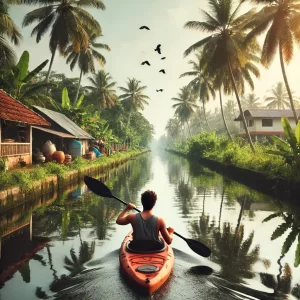
Kuttanad, the lush green heart of Kerala’s backwaters, is fast becoming one of the most captivating destinations for travelers seeking unique cultural experiences. Often referred to as the “Rice Bowl of Kerala”, Kuttanad is a region that thrives below sea level—a geographical rarity in India. But beyond its stunning paddy fields and tranquil water channels lies one of its most enchanting features: Kuttanad’s floating markets.
These water-bound markets are not only an integral part of the local lifestyle but also a growing attraction that could redefine eco-tourism in Kerala. As global travelers seek sustainable, authentic experiences, Kuttanad’s charm is set to inspire tourism models across the world.
Kuttanad:
Located in the districts of Alappuzha, Kottayam, and Pathanamthitta, Kuttanad is one of the few inhabited regions in the world where farming takes place below sea level. It is surrounded by the expansive Vembanad Lake, and intersected by rivers like the Pamba, Manimala, Achankovil, and Meenachil. These waterways form a crisscross of canals that are used not only for transportation but also as marketplaces.
The entire region looks like a canvas painted in green and blue—endless rice fields bordered by canals and swaying coconut palms. Kuttanad tourism thrives on this visual harmony, offering a refreshing escape from crowded cities and commercial travel destinations.
The Soul of Kuttanad: Floating Markets of Kerala
What sets Kuttanad’s floating markets apart from others across Asia is their authenticity. These are not tourist-created spectacles; they are part of daily life. In the early mornings, small wooden canoes glide through narrow canals, loaded with fresh vegetables, fruits, fish, groceries, and household goods. The vendors call out to homes along the banks, offering goods right at the doorstep.
This form of water-based commerce reflects the deep bond between the people and the backwaters. It is a remarkable example of sustainable living and a community-based economy. With minimal environmental impact and low carbon footprint, these floating markets represent an ideal blend of tradition and sustainability.
Global Attention:
-
Cultural Authenticity: Unlike commercialized floating markets designed for tourists, Kuttanad’s are fully functional systems serving local communities. They offer an authentic glimpse into life in Kerala’s backwaters.
-
Eco-Tourism Potential: As the global travel industry shifts toward low-impact tourism, Kuttanad offers a perfect example of eco-tourism in India. Its markets are operated without modern infrastructure or pollution-heavy transportation, making them ideal for conscious travelers.
-
Photographic Appeal: For photographers, Kuttanad’s floating markets are a dream. The reflection of canoes on the still waters, the vibrant hues of produce, and the peaceful expressions of boat vendors create striking visuals.
-
Educational Value: Tourists gain insights into sustainable farming, traditional livelihoods, and how people adapt to challenging geographies. It’s not just a sightseeing experience—it’s a lesson in resilience and innovation.
Changing Lifestyles, Preserved Traditions
While modernity has brought changes to Kuttanad—including better road access, internet connectivity, and migration of the younger generation—many traditional elements still hold strong. The reliance on canals for daily activities like trade, transport, and even social gatherings remains unchanged in several villages.
Today, the people of Kuttanad are adapting, blending old-world charm with new-age technologies. Mobile payments are being used in canoes. Tourists can now book village experiences and canal rides online. Yet the core identity of the floating markets remains untouched, making it a rare blend of heritage and modernity.
Floating Markets as a Global Tourism Model
Kuttanad’s water-bound lifestyle could inspire global tourism strategies in regions with similar ecosystems. Countries with riverine or delta regions can learn from Kuttanad’s community-led, environmentally-friendly model to build tourism that benefits both people and nature.
Key takeaways include:
-
Encouraging local participation in tourism to ensure income generation stays within the community.
-
Promoting heritage tourism that honors the original lifestyle without converting it into staged performances.
-
Creating awareness about climate-resilient livelihoods, especially in low-lying, water-rich regions.
Experiencing Kuttanad: A Must-Visit Destination
If you’re planning a visit to Kerala, make sure Kuttanad is on your itinerary. Here’s what you can experience:
-
Canoe Rides through serene canals with local guides sharing stories of the land.
-
Village Life Tours to explore how locals farm, cook, and live in harmony with water.
-
Stay in Backwater Homestays where you wake up to the sight of floating vendors calling out their wares.
-
Authentic Kerala Cuisine, including fresh produce bought right from a floating vendor.
These experiences offer more than scenic beauty—they provide emotional and cultural depth that travelers often seek but rarely find.
A Model for Responsible Travel
As sustainable tourism becomes more than just a buzzword, Kuttanad stands as a beacon of what’s possible. The region doesn’t just invite you to witness beauty—it invites you to understand a way of life that respects nature, community, and tradition.
The floating markets of Kuttanad are not mere tourist attractions; they are living institutions that teach us the value of balance, adaptation, and simplicity. If supported through responsible tourism practices, these markets could become a global symbol of how local traditions can lead the way in modern sustainable travel.
Kuttanad is more than just a picturesque region—it is a living classroom for sustainable practices, a sanctuary for slow travel, and a celebration of Kerala’s rich cultural identity. As its floating markets gain global attention, Kuttanad’s story is no longer just local—it’s universal.
In a world craving authenticity and connection, Kuttanad tourism offers a meaningful alternative. It proves that the future of travel lies not in concrete and luxury, but in communities that live in harmony with nature, sharing their traditions with open hearts and open boats.
